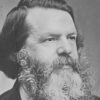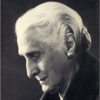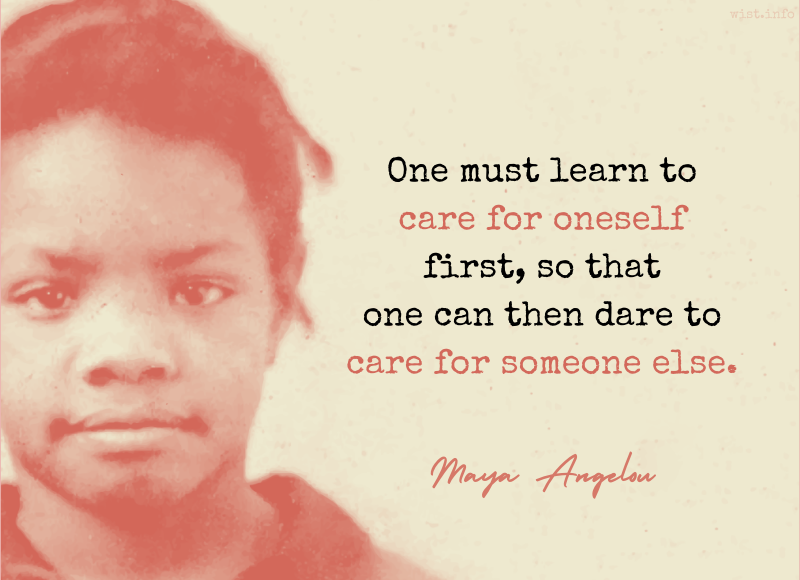Each friend represents a world in us, a world possibly not born until they arrive, and it is only by this meeting that a new world is born.
Quotations about:
relationship
Note not all quotations have been tagged, so Search may find additional quotes on this topic.
“Home” is any four walls that enclose the right person.
Helen Rowland (1875-1950) American journalist and humorist
Reflections of a Bachelor Girl (1909)
(Source)
No speed of wind or water rushing by
But you have a speed far greater. You can climb
Back up a stream of radiance to the sky,
And back through history up the stream of time.
And you were given this swiftness, not for haste
Nor chiefly that you may go where you will.
But in the rush of everything to waste,
That you may have the power of standing still—
Off any still or moving thing you say.
Two such as you with a master speed
Cannot be parted nor be swept away
From one another once you are agreed
That life is only life forevermore
Together wing to wing and oar to oar.Robert Frost (1874-1963) American poet
“The Master Speed” (1934)
(Source)
Collected in A Further Range (1937). Frost wrote the poem for his daughter's wedding, and the final line is the epitaph on his wife's portion of their gravestone.
The natural approach to human relations presumes that to know any person well enough is to love him, and that, therefore, the only human problem is a communication problem. It refuses to admit the possibility that people might be separated by basic, deeply held, genuinely irreconcilable differences — philosophical, political, or religious. Thus, the effort to trivialize etiquette as being a barrier to the happy mingling of souls, actually trivializes intellectual, emotional, and spiritual convictions by characterizing any difference between one person’s and another’s as no more than a simple misunderstanding, easily solved by frank exchanges or orchestrated “encounters.”
Judith Martin (b. 1938) American author, journalist, etiquette expert [a.k.a. Miss Manners]
Common Courtesy, “In the Quest for Equality, Civilization Itself Is Maligned” (1985)
(Source)
Originally published in The New Republic in 1984.
But we are so blind to our own shortcomings, so wide awake to those of others. Everything that happens to us is always the other person’s fault. Angelina would have gone on loving Edwin forever and ever and ever if only Edwin had not grown so strange and different. Edwin would have adored Angelina through eternity if Angelina had only remained the same as when he first adored her.
It is a cheerless hour for you both when the lamp of love has gone out and the fire of affection is not yet lit, and you have to grope about in the cold, raw dawn of life to kindle it. God grant it catches light before the day is too far spent. Many sit shivering by the dead coals till night come.Jerome K. Jerome (1859-1927) English writer, humorist [Jerome Klapka Jerome]
Idle Thoughts of an Idle Fellow, “On Being In Love” (1886)
(Source)
Mature people relate to each other without the need to merge.
“God is love,” as Scripture says, and that means the revelation is in the relationship. “God is love” means God is known devotionally, not dogmatically. “God is love” does not clear up old mysteries; it discloses new mystery. “God is love” is not a truth we can master; it is only one to which we can surrender. Faith is being grasped by the power of love.
William Sloane Coffin, Jr. (1924-2006) American minister, social activist
“Emmanuel,” sermon (1979-12-09)
(Source)
Sermon on Matthew 1:23.
Coffin had used very similar language in an earlier sermon, "Born to Set Thy People Free" (1977-12-04), on John 1:14:
God is known devotionally, not dogmatically. If as Scripture says, "God is love," then the revelation is the relationship. Christianity is not cleaning up old mysteries; it's the disclovsure of a new mystery. It is not a truth that you can master; it's only one to which you can surrender. Faith is being grasped by the power of love.
The truth is I’ve never fooled anyone. I’ve let men sometimes fool themselves. Men sometimes didn’t bother to find out who and what I was. Instead they would invent a character for me. I wouldn’t argue with them. They were obviously loving somebody I wasn’t. When they found this out, they would blame me for disillusioning them — and fooling them.
Marilyn Monroe (1926-1962) American actress, sex symbol
My Story, ch. 24 “Another Love Affair Ends” (1974) [with Ben Hecht]
(Source)
Good fences make good neighbors.
Robert Frost (1874-1963) American poet
“Mending Wall” (1914)
(Source)
The narrator's neighbor speaking. The phrase predates Frost (and has analogs in many languages and cultures), but achieved additional currency by his use.
Only choose in marriage a woman whom you would choose as a friend if she were a man.
[Il faut ne choisir pour épouse que la femme qu’on choisirait pour ami, si elle était homme.]
Joseph Joubert (1754-1824) French moralist, philosopher, essayist, poet
Pensées [Thoughts], ch. 8 “De la Famille et de la Société, etc. [On the Family and Society],” ¶ 9 (1850 ed.) [tr. Collins (1928), ch. 7]
(Source)
(Source (French)). Alternate translations:
We should choose for a wife only the woman we should choose for a friend, were were she a man.
[tr. Calvert (1866), ch. 8]
One ought not to choose for a wife a woman whom one would not choose for a friend, were she a man.
[tr. Attwell (1896), ¶ 98]
One should only choose for a wife a woman whom one would choose for a friend, were she a man.
[tr. Lyttelton (1899), ch. 7, ¶ 4]
Do not choose for your wife any woman you would not choose as your friend if she were a man.
[tr. Auster (1983)], 1801]
As my father used to say: “There are two sure ways to lose a friend, one is to borrow, the other to lend.”
Patrick Rothfuss (b. 1973) American author
The Name of the Wind, ch. 49 “The Nature of Wild Things” (2007)
(Source)
I wanted to love you: you prefer
To have me as your courtier.
Well, I must follow your direction.
But goodbye, Sextus, to affection.[Vis te, Sexte, coli: volebam amare.
Parendum est tibi: quod iubes, coleris:
Sed si te colo, Sexte, non amabo.]Martial (AD c.39-c.103) Spanish Roman poet, satirist, epigrammatist [Marcus Valerius Martialis]
Epigrams [Epigrammata], Book 2, epigram 55 (2.55) (AD 86) [tr. Michie (1972)]
(Source)
"To Sextus." (Source (Latin)). Alternate translations:
I Offer Love, but thou Respect wilt have;
Take, Sextus, all thy Pride and Folly crave:
But know I can be no Man's Friend and Slave.
[tr. Sedley (1702)]
The more I honour thee, the less I love.
[tr. Johnson (c. 1755)]
Yes, I submit, my lord; you've gained your end:
I'm now your slave -- that would have been your friend;
I'll bow, I'll cringe, be supple as your glove;
-- Respect, adore you -- ev'rything but -- love.
[tr. Graves (1766)]
Sextus, would'st though courted be?
I had hopes of loving thee.
If thou wilt, I must obey;
I shall court thee, nor delay.
Dost thou ceremony seek?
And renounce my friendship? Speak.
[tr. Elphinston (1782), Book 5, ep. 35]
To love you well you bid me know you better,
And for that wish I rest your humble debtor;
But, if the simple truth I may express,
To love you better, I must know you less.
[tr. Byron (c. 1820)]
You wish to be treated with deference, Sextus: I wished to love you. I must obey you: you shall be treated with deference, as you desire. But if I treat you with deference, I shall not love you.
[tr. Bohn's Classical (1859)]
You wish to be courted, Sextus; I wished to love you. I must obey you; as you demand, you shall be courted. But if I court you, Sextus, I shall not love you.
[tr. Ker (1919)]
I offered love -- you ask for awe;
Then I'll obey you and revere;
But don't forget the ancient saw
That love will never dwell with fear.
[tr. Pott & Wright (1921)]
You want my respect, I wanted to love you,
Sextus. I give in. Have my respect.
But I cannot prefer someone I defer to.
[tr. Bovie (1970)]
You would be courted, dear, and I would love you.
But be it as you will, and I will court you.
But if I court you, dear, I will not love you.
[tr. Cunningham (1971)]
You want to be cultivated, Sextus. I wanted to love you. I must do as you say. Cultivated you shall be, as you demand. But if I cultivate you, Sextus, I shall not love you.
[tr. Shackleton Bailey (1993)]
I would love you, dear, by preference,
But you instead demand my deference.
And so my love I will defer,
With courtesy, as you prefer.
[tr. Ericsson (1995)]
You ask for deference when I offer love;
So be it; you shall have my bended knee.
But Sextus, by great Jupiter above,
Getting respect, you'll get no love from me.
[tr. Hill]
You want to be my patron and my friend.
If you insist on patron, goodbye friend!
[tr. Wills (2007)]
I wished to love you; you would have
me court you. What you want must be.
But if I court you, as you ask,
Sextus, you'll get no love from me.
[tr. McLean (2014)]
The delight of social relations between friends is fostered by a shared attitude to life, together with certain differences of opinion on intellectual matters, through which either one is confirmed in one’s own views, or else one gains practice and instruction through argument.
[Le plaisir de la société entre les amis se cultive par une ressemblance de goût sur ce qui regarde les moeurs, et par quelques différences d’opinions sur les sciences: par là ou l’on s’affermit dans ses sentiments, ou l’on s’exerce et l’on s’instruit par la dispute.]
Jean de La Bruyère (1645-1696) French essayist, moralist
The Characters [Les Caractères], ch. 5 “Of Society and Conversation [De la Société et de la Conversation],” § 61 (5.61) (1688) [tr. Stewart (1970)]
(Source)
(Source (French)). Alternate translations:
The pleasure of Society amongst Friends is cultivated by a likeness of Inclinations, as to Manners; and a difference in Opinion, as to Sciences: the one confirms and humours us in our sentiments; the other exercises and instructs us by disputation.
[Bullord ed. (1696)]
The Pleasure of Society amongst Friends, is cultivated by a likeness of Inclinations, as to Manners, and by some difference in Opinion, as to Sciences: The one confirms us in our Sentiments, the other exercises and instructs us by Disputation.
[Curll ed. (1713)]
The pleasure of social intercourse amongst friends is kept up by a similarity of morals and manners, and by slender differences in opinion about science; this confirms us in our sentiments, exercises our faculties or instructs us through arguments.
[tr. Van Laun (1885)]
Write Injuries in Dust, Benefits in Marble.
Benjamin Franklin (1706-1790) American statesman, scientist, philosopher, aphorist
Poor Richard’s Almanack, “August” (1747)
(Source)
As with so much else of Franklin's, this phrase is not without earlier forms, e.g.: Thomas More, History of King Richard III (1513):
For men use, if they have an evil turn, to write it in marble; and whosoever does us a good turn, we write it in dust.
Or see Shakespeare, Henry VIII 4.2.45-46 (1613):
Men's evil manners live in brass, their virtues
We write in water.
Variants include "but kindnesses in marble" or "but kindness in marble."
This also shows up as a French saying in various forms:
- "Ecrivez les injures sur le sable, mais les bienfaits sur le marbre."
- "Écrivez les injures sur le sable, gravez les bienfaits sur le marbre."
When one considers what adults in their relationships can do to each other, it is frightening to think of what an adult can do to a child.
Marcelene Cox (1900-1998) American writer, columnist, aphorist
“Ask Any Woman” column, Ladies’ Home Journal (1946-03)
(Source)
What television does is rent us friends and relatives who are quite satisfactory. The child watching TV loves these people, you know — they’re in color, and they’re talking to the child. Why wouldn’t a child relate to these people? And you know, if you can’t sleep at 3 o’clock in the morning, you can turn on a switch, and there are your friends and relatives, and they obviously like you. And they’re charming. Who wouldn’t want Peter Jennings for a relative? This is quite something, to rent artificial friends and relatives right inside the house.
Kurt Vonnegut, Jr. (1922-2007) American novelist, journalist
“The Salon Interview: Kurt Vonnegut,” interview by Frank Houston, Salon (8 Oct 1999)
(Source)
Death ends a life … but it does not end a relationship, which struggles on in the survivor’s mind … toward some resolution, which it never finds.
Robert Anderson (1917-2009) American playwright, screenwriter, theater producer
I Never Sang for My Father, Act 2, Closing Monologue [Gene] (1968)
(Source)
(Ellipses in original.) The line is also given at the beginning of Act 1, where it reads:
Death ends a life, but it does not end a relationship, which struggles on in the survivor's mind towards some final resolution, some clear meaning, which it perhaps never finds.
In the 1970 adaptation Anderson made for film, the line is given as "which it may never find."
I like to see the Old Man now and then
And try not to be too uncivil.
It’s charming in a noble squire when
He speaks humanely with the very Devil.[Von Zeit zu Zeit seh ich den Alten gern,
Und hüte mich, mit ihm zu brechen.
Es ist gar hübsch von einem großen Herrn,
So menschlich mit dem Teufel selbst zu sprechen.]Johann Wolfgang von Goethe (1749-1832) German poet, statesman, scientist
Faust: a Tragedy [eine Tragödie], Part 1, sc. 3 “Prologue in Heaven,” l. 350ff [Mephistopheles] (1808-1829) [tr. Kaufmann (1961)]
(Source)
Some translations (and this site) include the Declaration, Prelude on the Stage, and Prologue in Heaven as individual scenes; others do not, leading to their Part 1 scenes being numbered three lower.
On his discussions with the Lord. (Source (German)). Alternate translations:
I like to see the Old Man not infrequently,
And I forbear to break with Him or be uncivil;
It's very pretty in so great a Lord as He
To talk so like a man even with the Devil.
[tr. Priest (1808)]
From time to time I visit the Old Fellow,
And I take care to keep on good terms with him.
Civil enough is this same God Almighty,
To talk so freely with the Devil himself.
[tr. Shelley (1815)]
I like to see the Ancient One occasionally, and take care not to break with him. It is really civil in so great a Lord, to speak so kindly with the Devil himself.
[tr. Hayward (1831)]
The ancient one I like sometimes to see,
And not to break with him am always civil;
'Tis courteous in so great a lord as he,
To speak so kindly even to the devil.
[tr. Swanwick (1850)]
I like at times to exchange with him a word,
And take care not to break with him. 'Tis civil
In the old fellow and so great a Lord
To talk so kindly with the very devil.
[tr. Brooks (1868)]
I like, at times, to hear The Ancient's word,
And have a care to be most civil:
It's really kind of such a noble Lord
So humanly to gossip with the Devil!
[tr. Taylor (1870)]
From time to time the ancient gentleman
I see, and keep on the best terms I can.
In a great Lord ’tis surely wondrous civil
So face to face to hold talk with the devil.
[tr. Blackie (1880)]
I like to see the Ancient now and then,
And shun a breach, for truly 'tis most civil
In such a mighty personage to deign
To chat so affably, e'en with the very Devil.
[tr. Latham (1908)]
From time to time it's good to see the Old Man;
I must be careful not to break with him.
How decent of so great a personage
to be so human with the devil.
[tr. Salm (1962)]
At times I don't mind seeing the old gent,
And try to keep relations smooth and level.
Say what you like, it's quite a compliment:
A swell like him so man-to-man with the Devil!
[tr. Arndt (1976)]
I like to see him sometimes, and take care
Not to fall out with him. It's civil
Of the old fellow, such a grand seigneur,
To have these man-to-man talks with the Devil!
[tr. Luke (1987)]
I like to see the Old Man now and then,
And take good care I don't fall out with him.
How very decent of a Lord Celestial
To talk man to man with the Devil of all people.
[tr. Greenberg (1992)]
I like to drop in on him if I can,
Just to keep things between us on the level.
It's really decent of the Grand Old Man
To be so civil to the very Devil.
[tr. Williams (1999)]
I like to hear the Old Man’s words, from time to time,
And take care, when I’m with him, not to spew.
It’s very nice when such a great Gentleman,
Chats with the devil, in ways so human, too!
[tr. Kline (2003)]
I discovered that I don’t nearly have the fear of death that I once had. What I do have is the terrible awareness of how little time there is to accomplish so many of the things that you want to accomplish. The other thing that seems accentuated, almost to a point of distortion, is the need, the desperate need you have of family, of loved ones. When it appeared possible I might not make it, I didn’t feel so much the awful awareness of, Jesus Christ, it’s going to be me ending the earth. What seemed to me the most predominant in my fears was that it would be the relationships that would end.
Rod Serling (1924-1975) American screenwriter, playwright, television producer, narrator
Audio diary (1975-05)
(Source)
Recorded comments in the hospital after his first heart attack. In Anne Serling, As I Knew Him: My Dad, Rod Serling (2013).
What is the opposite of two?
A lonely me, a lonely you.Richard Wilbur (1921-2017) American poet, literary translator
“Some Opposites,” Opposites (1973)
(Source)
The commitment problem has caused many women to mistakenly conclude that men, as a group, have the emotional maturity of hamsters. This is not the case. A hamster is much more capable of making a lasting commitment to a woman, especially if she gives it those little food pellets. Whereas a guy, in a relationship, will consume the pellets of companionship, and he will run on the exercise wheel of lust, but as soon as he senses the door of commitment is about to close and trap him in the wire cage of true intimacy, he’ll squirm out, scamper across the kitchen floor of uncertainty, and hide under the refrigerator of nonreadiness.
Dave Barry (b. 1947) American humorist
The Greatest Invention in the History of Mankind is Beer (2001)
(Source)
Not to talk with people although they can be talked with is to waste people. To talk with people although they can’t be talked with is to waste words. A man of understanding does not waste people, but he also does not waste words.
[子曰、可與言、而不與之言、失人、不可與言、而與之言、失言、知者不失人、亦不失言。]
Confucius (c. 551- c. 479 BC) Chinese philosopher, sage, politician [孔夫子 (Kǒng Fūzǐ, K'ung Fu-tzu, K'ung Fu Tse), 孔子 (Kǒngzǐ, Chungni), 孔丘 (Kǒng Qiū, K'ung Ch'iu)]
The Analects [論語, 论语, Lúnyǔ], Book 15, verse 8 (15.8) (6th C. BC – 3rd C. AD) [tr. Dawson (1993)]
(Source)
(Source (Chinese)). Older translations use Legge's original verse divisions and numbering (15.7).
The passage contains a native pun, combining both noun and verb senses of yén [言] (talk), which is difficult to translate into English (leading to blends of "speak" and "talk" and "words"). Alternate translations:
When a man may be spoken with, not to speak to him is to err in reference to the man. When a man may not be spoken with, to speak to him is to err in reference to our words. The wise err neither in regard to their man nor to their words.
[tr. Legge (1861), 15.7]
Not to speak to a man to whom you ought to speak, is to lose your man; to speak to one to whom you ought not to speak is to lose your words. those who are wise will not lose their man, nor yet their words.
[tr. Jennings (1895), 15.7]
When you meet the proper person to speak to and do not speak out, you lose your opportunity; but when you meet one who is not a proper person to speak to and you speak to him, you waste your words. A man of intelligence never loses his opportunity, neither does he waste his words.
[tr. Ku Hung-Ming (1898), 15.7]
Not to enlighten one who can be enlightened is to waste a man; to enlighten one who cannot be enlightened is to waste words. The intelligent man neither wastes his man nor his words.
[tr. Soothill (1910), 15.7]
When you should talk to a man, and don’t, you lose the man; when it’s no use talking to a man, and you talk to him, you waste words. An intelligent man wastes (loses) neither men nor words.
[tr. Pound (1933), 15.7]
Not to talk to one who could be talked to, is to waste a man. To talk to those who cannot be talked to, is to waste one's words. He who is truly wise never wastes a man; but on the other hand, he never wastes his words.
[tr. Waley (1938), 15.7]
If we fail to speak with a man who can be spoken with, we lose a man. If we do speak with a man who cannot be spoken with, our words go for nought. The wise lose neither man nor words.
[tr. Ware (1950), 15.8]
When you find a person worthy to talk to and fail to talk to him, you have lost your man. When you find a man unworthy to talk to and you talk to him, you have lost (i.e., wasted) your words. A wise man neither loses his man, nor loses his words.
[tr. Lin Yutang (1938)]
To fail to speak to a man who is capable of benefiting is to let a man go to waste. To speak to a man who is incapable of benefiting is to let one's words go to waste. A wise man lets neither men nor words go to waste.
[tr. Lau (1979), 15.8]
When dealing with a man who is capable of understanding your teaching, if you do not teach him, you waste the man. When dealing with a man who is incapable of understanding your teaching, if you do teach him, you waste your teaching. A wise teacher wastes no man and wastes no teaching.
[tr. Leys (1997), 15.8]
If a man is worth talking to and you do not talk to him, you lose a man; if a man is not worth talking to and you talk to him, you lose your words. The man of wisdom neither loses a man nor loses his words.
[tr. Huang (1997), 15.8]
When you should talk with one, you do not talk with one, it means to lose the people. When you should not talk with one, you talk with one, it means to lose the word. A wise person does not lose the people, and does not lose the word too.
[tr. Cai/Yu (1998), 15.8 / #392]
To fail to speak to someone who can be engaged is to let that person go to waste; to speak to someone who cannot be engaged is to waste your words. The wise [zhi] do not let people go to waste, but they do not waste their words, either.
[tr. Ames/Rosemont (1998), 15.8]
If he can be talked to and you do not talk to him, you waste the man. If he cannot be talked to and you talk to him, you waste your talk. The knowledgeable will not waste a man, but will also not waste his talk.
[tr. Brooks/Brooks (1998), 15.8]
When a person is capable of understanding your words, and you refuse to speak, you're wasting a person. When a person isn't capable of understanding your words, and you speak anyway, you're wasting words. The wise waste neither words nor people.
[tr. Hinton (1998), 15.8]
If it's someone you ought to speak to and you fail to speak, you waste a person. If it's someone you ought not to speak to and you speak, you waste words. The wise man doesn't waste people and doesn't waste words, either.
[tr. Watson (2007), 15.8]
Not to speak to a man who is capable of absorbing what you say is to let the man go to waste. To speak to a man who is incapable of absorbing what you say is to let your words go to waste. A person of wisdom does not let either men or words go to waste.
[tr. Annping Chin (2014), 15.8]
When it is appropriate and feasible to speak [and give advice] to a person, but you refrain from doing so, you will lose a friend. When it is inappropriate or infeasible to speak to a person, but you speak anyhow, you misspeak.
[tr. Li (2020), 15.8]
How sweet and gracious, even in common speech,
Is that fine sense which men call Courtesy!
Wholesome as air and genial as the light,
Welcome in every clime as breath of flowers,
It transmutes aliens into trusting friends,
And gives its owner passport round the globe.
For ages past, women were defined only in relation to other people, and the definition lingers: a woman may be called a wife and mother for most of her life, while a man is called a husband and father only at his funeral.
Barbara Holland (1933-2010) American author
One’s Company: Reflections on Living Alone, ch. 1 (1992)
(Source)
We were not a latter-day Héloïse and Abelard, Pelléas and Mélisande when we married. For one thing the Héloïse and Abelards, Pelléases and Mélisandes, do not get married and stay married for forty years. A love which depends solely on the combustion of two attracting chemistries, tends to fizzle out. The famous lovers usually end up dead. A long-term marriage has to move beyond chemistry to compatibility, to friendship, to companionship. It is certainly not that passion disappears, but that it is conjoined with other ways of love.
Madeleine L'Engle (1918-2007) American writer
Two-Part Invention: The Story of a Marriage (1988)
(Source)
Agatha looked up. “I guess. I just wonder how many other girls have to worry about whether or not it’s smart to really trust their … you know, the guys they –”
Lady Vitriox crossed her arms. “All of them,” she said flatly.
“But mine has an army!”
The old woman shook her head. “They all do, my Lady. It consists of other men.”
Phil Foglio (b. 1956) American writer, cartoonist
Agatha H. and the Siege of Mechanicsburg (2020) [with Kaja Foglio]
(Source)
Captious, yet kind; pleasant but testy too;
I cannot bear to part, or live with you.[Difficillis facillis, iucundus acerbus es idem:
Nec tecum possum vivere nec sine te.]Martial (AD c.39-c.103) Spanish Roman poet, satirist, epigrammatist [Marcus Valerius Martialis]
Epigrams [Epigrammata], Book 12, epigram 47 (12.47) (AD 101) [tr. Pott & Wright (1921)]
(Source)
Sometimes given as 12.46. Ker notes the second line is borrowed from Ovid, Amores, 3.9.
(Source (Latin)). Alternate translations:
In all thy humours whether grave or mellow,
Thou'rt such a touchy, testy, pleasant fellow;
Hast so much wit and mirth, and spleen about thee
There is no living with thee, or without thee.
[Addison, The Spectator #68 (18 May 1711)]
Such stiffness, ease; such sweets and sours about thee!
I cannot live, or with thee, or without thee.
[tr. Elphinston (1782), Book 12, #126]
Difficult and easy, churlish and pleasing; you are all of these, and yet one person;
there is no living with thee, nor without thee.
[tr. Amos (1858), ch. 3 #85]
Thou'rt merry, sad; easy, and hard to please;
Nor with nor from thee can I live at ease.
[tr. Wright (<1859)]
You are at once morose and agreeable, pleasing and repulsive.
I can neither live with you, nor without you.
[tr. Bohn's Classical (1859)]
Captious, yet complaisant, sweet and bitter too,
I cannot with thee live, nor yet without thee.
[ed. Harbottle (1897)]
Difficult and easy-going, pleasant and churlish, you are at the same time:
I can neither live with you nor without you.
[tr. Ker (1919)]
O sweet and bitter in a breath,
O genial comrade, crusty friend,
Without thee life had sudden end,
With thee to dwell were sudden death.
[tr. Francis & Tatum (1924), #662]
There's something easy, difficult,
Hard and soft about you
All the time. I cannot live
With you or without you.
[tr. Marcellino (1968)]
Amiable but unco-operative,
Sweet-natured but a grouse --
Though I can't live without you, I can live
Without you in the house.
[tr. Michie (1972)]
You are difficult and easy, pleasant and sour; and I can't live with you nor yet without you.
[tr. Shackleton Bailey (1993), 12.46]
You're difficult and easy, sweet and tart.
I cannot live with you, nor live apart.
[tr. McLean (2014), 12.46]
Difficult or easy, pleasant or bitter, you are the same you:
I cannot live with you -- or without you.
[Source]
Such is the privilege of genius; it perceives, it seizes relations where vulgar eyes see only isolated facts.
[Tel est le privilége du génie: il aperçoit, il saisit des rapports, là où des yeux vulgaires lie voient que des faits isolés.]
François Arago (1786-1853) French Catalan mathematician, physicist, astronomer, politician
Biographies of Distinguished Scientific Men, “Joseph Fourier” (1859) [tr. Smyth, Powell, Grant]
(Source)
Asking who’s the “man” and who’s the “woman” in a same-sex relationship is like asking which chopstick is the fork.
This is love, and the trouble with it: it can make you embarrassed. Love is really liking someone a whole lot and not wanting to screw that up. Everybody’s chewed over this. This unites us, this part of love.
Not listening is probably the commonest unkindness of married life, and one that creates — more devastatingly than an eternity of forgotten birthdays and misguided Christmas gifts — an atmosphere of not loving and not caring.
I love not to be constrained to love; for love must only arise of the heart’s self, and not by no constraint.
Thomas Malory (c. 1415-1471) English writer
Le Morte d’Arthur, Book 18, ch. 20 (1485)
(Source)
Lancelot to Guinevere, of the Lady of Ascolat.
We’re here to use our intelligence, yes, but that ain’t everything. It’s our duty to see through things, but also to see things through. Or I’ll put it another way. We’re not primarily put on this earth to see through one another, but to see one another through.
Peter De Vries (1910-1993) American editor, novelist, satirist
Let Me Count the Ways (1965)
(Source)
To care passionately for another human creature brings always more sorrow than joy; but all the same … one would not be without that experience. Anyone who has never really loved has never really lived.
One hardly dares to say that love is the core of the relationship, though love is sought for and created in relationship; love is rather the marvel when it is there, but it is not always there, and to know another and to be known by another — that is everything.
Florida Scott-Maxwell (1883-1979) American-British playwright, author, psychologist
Women and Sometimes Men (1957)
(Source)
People who care for you inevitably become beautiful.
One must learn to care for oneself first, so that one can then dare to care for someone else. That’s what it takes to make the caged bird sing.
Maya Angelou (1928-2014) American poet, memoirist, activist [b. Marguerite Ann Johnson]
In Jeffrey M. Elliot, “Maya Angelou Raps,” Sepia (Oct 1977)
(Source)
Marriage is nine-tenths talk.
H. L. Mencken (1880-1956) American writer and journalist [Henry Lewis Mencken]
Diary (1945-05-30)
(Source)
Candor is always a double-edged sword; it may heal or it may separate.
Wilhelm Stekel (1868-1940) Austrian physician, psychologist
Marriage at the Crossroads (1931)
(Source)
Blaming mother is just a negative way of clinging to her still.
How wonderful to have someone to blame! How wonderful to live with one’s nemesis! You may be miserable, but you feel forever in the right. You may be fragmented, but you feel absolved of all the blame for it. Take your life in your own hands, and what happens? A terrible thing: no one to blame.
The joy of love is too short, and the sorrow thereof, and what cometh thereof, dureth over long.
CHARLIE ANDERSON: There’s some difference between lovin’ and likin’. When I married Jennie’s mother, I — I didn’t love her — I liked her — I liked her a lot. I liked Martha for at least three years after we were married and then one day it just dawned on me I loved her. I still do … still do. You see, Sam, when you love a woman without likin’ her, the night can be long and cold, and contempt comes up with the sun.
THE SERGEANT: When men and women pick one another up for just a bit of fun, they find they’ve picked up more than they bargained for, because men and women have a top story as well as a ground floor, and you can’t have the one without the other.
George Bernard Shaw (1856-1950) British playwright and critic
Too True to Be Good, Act 3 (1932)
(Source)
In youth, it was a way I had
To do my best to please,
And change, with every passing lad,
To suit his theories.But now I know the things I know,
And do the things I do;
And if you do not like me so,
To hell, my love, with you!
My mother said it was simple to keep a man, you must be a maid in the living room, a cook in the kitchen, and a whore in the bedroom. I said I’d hire the other two and take care of the bedroom bit.
The essence of spiritual practice is your attitude toward others.
The Dalai Lama (b. 1935) Tibetan Buddhist spiritual leader [The 14th Dalai Lama; a/k/a Lhama Thondup / Lhama Dhondrub; b. Tenzin Gyatso]
“The Dalai Lama in Depth,” Interview with Catherine Ingram, Yoga Journal (Jan/Feb 1990)
(Source)
I realize that all society rests upon force. But all the great creative actions, all the decent human relations, occur during the intervals when force has not managed to come to the front. These intervals are what matter. I want them to be as frequent and as lengthy as possible, and I call them “civilization”.
E. M. Forster (1879-1970) English novelist, essayist, critic, librettist [Edward Morgan Forster]
“What I Believe,” The Nation (16 Jul 1938)
(Source)
















































